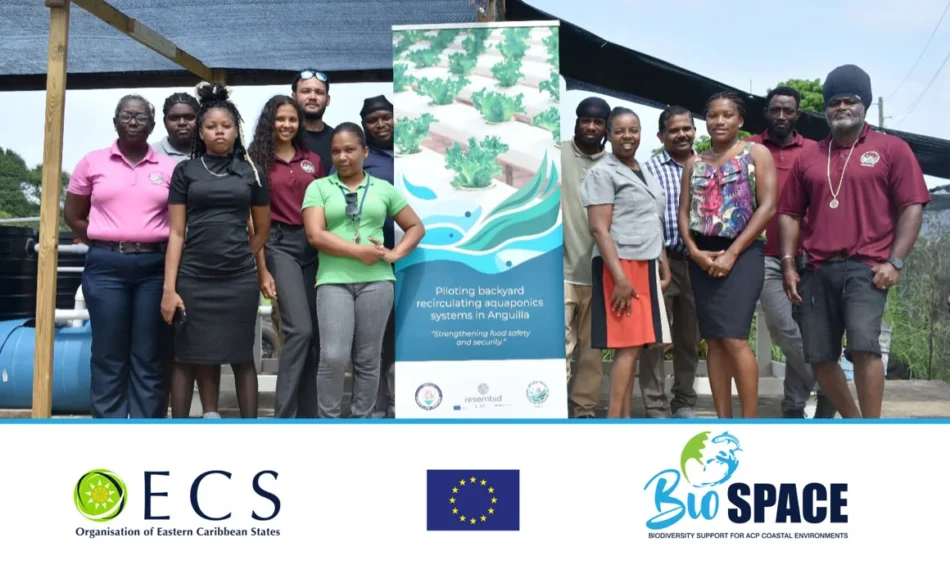OECS and EU Support Digitisation of Anguilla’s Fisheries

Media Release Courtesy CRFM
June 24, 2024 — A Technical Team of the Caribbean Regional Fisheries Mechanism (CRFM) Secretariat is collaborating with the Fisheries and Marine Resource Unit (FMRU) of Anguilla and the Organisation of Eastern Caribbean States (OECS) Commission, under the European Union-funded Biodiversity Support Programme for ACP Coastal Environments (BioSPACE) to develop a framework for a statistically sound data collection, management, and reporting system for the coastal and marine fisheries of Anguilla. This initiative is directly aligned with BioSPACE’s objective of supporting national and local efforts to assess, protect, manage, and sustainably use marine and terrestrial biodiversity.
“We chose to take a participatory approach to the development of the framework, so staff at Anguilla’s Fisheries and Marine Resource Unit were involved in the collection and analysis of data from fish landing sites, an aquaponics census, as well as biological samples from the fish trap reef fishery,” remarked Dr. Sandra Grant, Deputy Executive Director, CRFM Secretariat. “We took a novel approach by introducing digitization in data collection and management, and we will use the information captured to design a statistically sound data system for Anguilla.”
The CRFM Technical Team—comprised of Dr. Grant – CRFM Deputy Executive Director, Mrs. Junes Masters – CRFM Statistics and Information Analyst, and Dr. Pranaya Parida – CRFM Fisheries Scientist—visited Anguilla to provide hands-on training to strengthen the capacity of the FMRU. The training was delivered in two phases. From 13-15 May 2024, there were online sessions on data collection and analysis, and from 21-28 May 2024, there was an in-person census of fish landing sites and aquaponics facilities, biological sampling of major fish groups, and analysis of the data collected. A total of 12 persons benefited from the capacity-building activities.
Building upon previous work done by Fisheries authorities in Anguilla, the census helped to capture data, using digital technologies on 145 fishing vessels, fish landing sites, and aquaponics facilities. The support provided by the CRFM to update and streamline processes will strengthen Anguilla’s vessel registration and licensing systems and support evidence-based management of its fisheries. Furthermore, the collection and analysis of biological data—weight, length, sex, and maturity—from ten species of sampled finfish, contribute towards a deeper understanding of the status of the fish stocks upon which Anguilla depends for food security and the sustainable livelihoods of fishers.
The CRFM Technical Team led the analysis, verification, and validation of the data captured, providing valuable information and insights to Anguilla’s Fisheries and Marine Resource Unit, thereby empowering the CRFM Member State to utilize modern tools to improve its management and oversight of the sector.
“Evidence-based decision-making is critical for fisheries management and updating the Anguilla Fisheries Development Plan. The quality of national fishery statistics depends on adequate funding for the adoption of measures necessary to improve and maintain data quality. The workshops were timely as there are a number of changes happening in fisheries, which could benefit from this sort of training—one of the most impactful changes being amendments to the Fisheries and Marine Parks legislation, for sustainable fisheries development and coastal protection,” noted Kafi Wallace, Director, Fisheries and Marine Resource Unit, Anguilla. She also emphasized the commitment of the Fisheries Unit to engage stakeholders and share the data generated during the recent exercise.
“This hands-on training was well delivered by the CRFM team, and I greatly appreciate that it was delivered by the CRFM, as a regional CARICOM institution that understands our fisheries and recognises our limitations. The ability to make data-driven decisions is a crucial element of good Fisheries management. This training has modernised our ability to do this. I loved that the introduction of the Kobo Toolbox will expedite the data collection and analysis process and help us to reduce the chances of user-generated errors,” remarked Remone Johnson, Fisheries Manager, FMRU, Anguilla.

“As it relates to staff, the training has done three things, in my opinion. One: the immediate digitization reduced staff workload and allowed us to concentrate on other matters. Two: the training has reinforced to us that we need to collect good quality data in the first instance, which is essential. Three: the training has bolstered the relationship between the data analyst and the data collectors. This, again, is expected to reduce errors and improve the quality of the data we produce,” he added.
The EU-funded BioSPACE Project is a support programme that was developed to contribute to the sustainable development of ACP Small Island Developing States (SIDS) and coastal countries, while at the same time supporting efforts towards achieving the UN Sustainable Development Goals (SDGs). BioSPACE supports the CRFM’s commitment to improving the quality of national and regional data systems in accordance with the Caribbean Community Common Fisheries Policy by building the institutional capabilities of Members to conduct research, collect, and analyse data; improve networking and collaboration among Members; formulate and implement policies; and make decisions.
The CRFM Team thanks the Fisheries and Marine Resource Unit for its continued dedication to improving the lives of fishers and their communities, and the OECS Commission and the EU for the support provided under this project towards strengthening the sustainability and resilience of the region’s fisheries and aquaculture sector.





